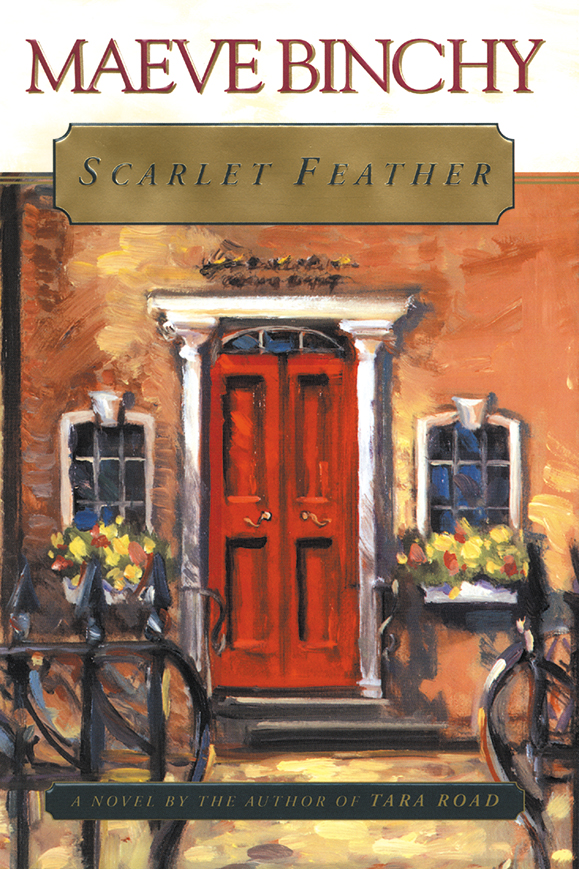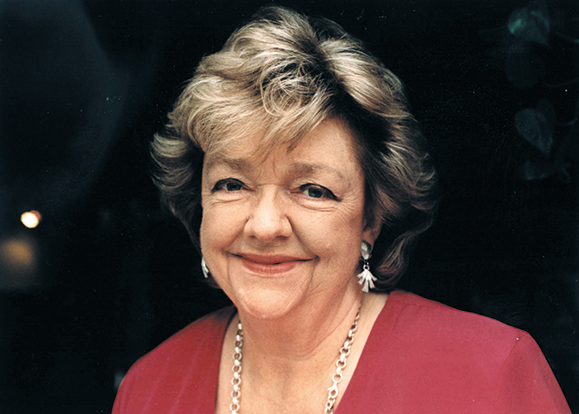No one tells stories like Irish writer Maeve Binchy. Humane, down-to-earth, funny, her novels have captured imaginations on both sides of the Atlantic in a way most authors only dream of. Millions of her fans were disappointed when she announced last year she was retiring from both novel writing and her weekly column with The Irish Times.
The newly released Scarlet Feather is to be the last of her 600-page novels. But not to worry, we haven’t heard the last of her. She talks about writing and fame with Sarah Buscher.
Where do you do your writing?
We have a small house in Dalkey, County Dublin. We built on to the upstairs, a lovely glass-surrounded room that has lots of light, and a big long desk. Gordon [Maeve’s husband, Gordon Snell, writes books for children] works at one end of the desk and I work at the other. We have a rule about work, which is that we have to tell each other the absolute truth, but we also allow what we called “sulking time.”
Where does the inspiration for your novels come from?
I find it harder to choose between ideas than find them.
Everywhere I look I see an idea. With Scarlet Feather, for instance, I have two friends who are caterers who kept telling me amazing stories about the people they cater to. Usually, they meet people at times of high stress – weddings, funerals, christenings, anniversaries, birthdays, retirements, are never totally relaxed occasions, – dramas unfold. So I thought a catering firm would be a good place to set a novel.
Would you say that your books come out of listening?
Absolutely. In every book I’ve ever written there’s always been some sense of “Oh God, that’d make a great book.”
For Tara Road I overheard one woman say to another woman in a restaurant, “I’m divorced. I always thought we had been happily married, but my husband said we hadn’t been happy for years.” So I thought that was the way to do that one.
You just get a sense of something that triggers something off in your mind.
How do you turn that into a several-hundred-page novel?
I sit down and I think, this is my thesis, this is my belief, that catering is a time of great stress. I also wanted to explain to people who are not Irish, how rich Ireland has become, because twenty years ago it would have been ludicrous to write a book about catering in Ireland. Nowadays it’s quite the norm.
I think of writing as telling something that happened. It’s like if you’re a friend I haven’t seen for ages and we’re sitting down for a meal. It’s “Wait until I tell you about my friends Cathy and Tom in Ireland.”
I don’t think I have a style. The way I write, it’s always words tumbling over each other. And when they have tumbled into six or seven hundred pages of a book I just say to the editors, “Look, take out where you think I have repeated myself.”
I very rarely fight for things. Maybe I’m not critical enough or perfectionist enough, but I just think of it as a story that has to be told.
Who is your favorite writer?
William Trevor is without any doubt my favorite writer. I absolutely love him. I love Jennifer Johnston’s work, particularly How Many Miles to Babylon? I think everybody in the world should read that book. It’s just the most haunting story.
But what I read for relaxation are thrillers. I love Michael Connolly. And I also like Lee Childs and David Baldacci.
I could read a thriller a day. I could never write one. And I could never write like William Trevor or Jennifer Johnston.
Sometimes people ask who are my influences. I have no influences except the talkative style of the Irish people. What I’m trying to do is tell a story in a way that people will be interested.
You’re very curious, aren’t you?
Very curious. I never hang up on a crossed line. I listen to all, always. I eavesdrop on people. Sometimes I just put a very vacant look in my eyes as if I’m not altogether normal. I pretend I’m not listening and I listen to wonderful things. I’ve gotten off buses in London to follow people because they haven’t finished their stories.
It’s interesting how you came into writing. Your father sent one of your letters to The Irish Times and all of a sudden writing was just kind of thrust on you.
I just thought it was so damn easy. But then for a few years I had a bit of failure because I thought, “Well, if I can manage to do this when I’m not trying, heavens, what I’ll do when I am trying.” But of course that was the wrong thing to think. I was just showing off and boring people to death.
It’s really quite simple, just write as you talk and write about what you know. Once I realized that, then I was home and dry and I never had any more problems.
How did you make the leap to writing fiction?
That also was kind of an accident because I went to England in 1973 to pursue this man that I fancied. The thing about London that was so different is that in a city of 10 million people it’s very hard to get to know people. I didn’t want to be a hanger-on to all his [Gordon’s] friends. When my work was over I’d sit and write short stories. The book of short stories did reasonably well, and then I secretly wrote a novel in 1982 and when it was finished in 1983 it became an incredible best-seller.
Of course I suffered the paranoia of every writer – I thought maybe I had only one book in me. So when I wrote the next one and that also was a best-seller, I was very very relieved.
I was very cautious in the early days in case there was nothing more to come. I was telling myself, “You can’t get used to this kind of lifestyle because it might not be your speed forever.” So I bought all my pensions and my retirement plans. And then by the time the third one became a best-seller, it was “Aw, bloody hell, this is great!”
Looking back over your life, you’ve really come a long way.
I’ve been very lucky. I was dealt a very good hand. I was born into a happy family. There was enough food in the house and we didn’t have to emigrate. We weren’t wealthy but there was enough money to pay for our education – in those days all education had to be paid for. And I had nice jobs.

There was a bit of bad news along the way. I was fat, and that was awful because when you’re young and sensitive, you think the world is over because you’re fat. I was also a bit lame. And I loved the wrong fellows. I would go into a room and the most unsuitable man in that room I would find and cleave to. Then my parents died when I was young, which was awful. They died in their fifties. And I couldn’t have children. So that’s the bad side, but compared to everything else I have, it’s not all that terribly bad. I count my winners rather than my losers.
Happiness is knowing and appreciating what you’ve got. I am very, very, very grateful for what to me is dead easy. The shock has gone out of it but I’m very often surprised. Today we passed a Borders bookshop and I said to the publicity director, “Aren’t we to be signing there?” And she said, “Yes, wait till you see round the corner.” And there were four big windows with pictures of me and my book all over them.
How do you keep it from going to your head?
Most of the time I’m sensible enough not to take my own publicity too seriously. I was very lucky that I only became successful when I was 43. If it had happened earlier I would probably have gone mad. By the time you’re 43 you know what you want. I’m not interested in clothes. I’m not interested in jewelry or big property. The nice thing about money for me is that I can travel first class and I can take a car or taxi if I want to. I have four marvelous women who come in every Friday and clean my house and I regard that as the greatest luxury.
One of my friends once said to me, “Wealth is wasted on you, Maeve, because you have no style.” We live in the same house. We didn’t change, because the house suited us both. We thought it stupid to buy a big place with pillars that we’d eventually have to leave when we got too old for it. Whereas ours is a house you can grow old in, and it’s lovely.
I’ve never worried about money. I didn’t worry about it when I didn’t have it, and now that I have almost too much of it, I don’t worry about it. So I actually think I’m the right person to have money.
Is Gordon the same way as you?
He’s much more patient than I am. I am very impatient. I get very tired of people who are ditherers, or indecisive and people who destroy the lovely gifts that have been given to them. I can think of maybe a dozen people that I know who drive me mad by not being able to decide about things, or who are always finding the negative or seeing some bad purpose in other people’s minds, or being depressive. Gordon is much kinder, he’s more generous to people.
So, is Scarlet Feather really your last book?
For the moment it’s the last big one because when you write a 600-page book you have to go on a book tour and your life isn’t quite your own. At sixty, I feel twenty-four, I don’t think I’m really grown up at all. I think about what I’ll do when I get to my prime, and then I remember the age I actually am. I’d love more time to sit and read and play chess and have my friends in to dinner and go to places.
I’ve written loads of short stories and some novellas which haven’t been published yet. So there’ll be a book more or less every two years for the rest of my foreseeable life. So it’s not retirement in that sense.
It’s giving up my column [in The Irish Times] which is a great relief. I’d wake up on a Wednesday, pull the duvet back over my head and say, “Oh God, it’s Wednesday again.” There’s also my books which are being made into movies. So that will keep me busy. There’s plenty to do.
If I could control my impatience now, I’d be great. ♦


Leave a Reply